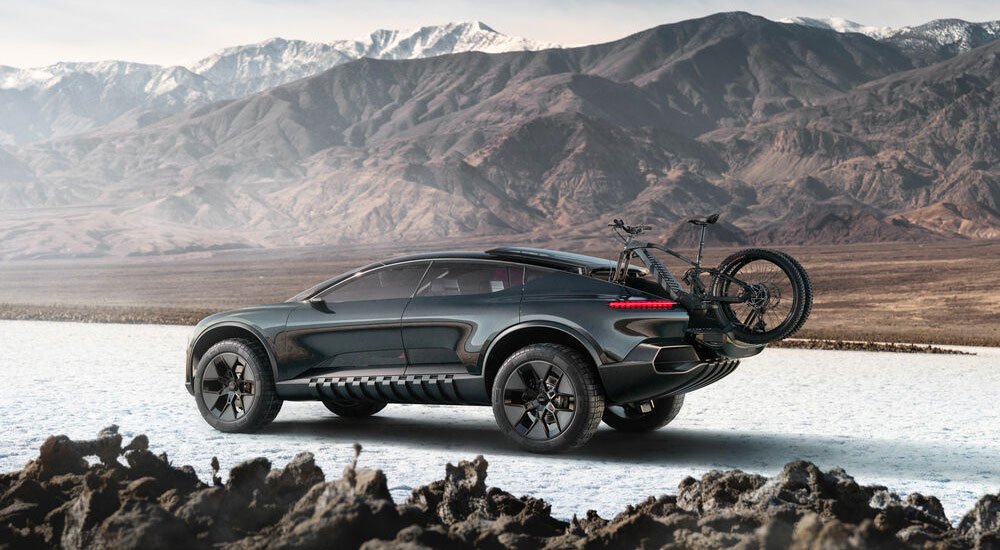
[ad_1]
Last week, Mercedes-Benz held a special event covering the future of Mercedes cars and vehicles altogether. Mercedes-Benz is one of the great automotive manufacturers in the world. Famous for quality, performance, design, and technology, Mercedes often stands above its peers. While many in the U.S. believe Henry Ford created the first automobile, it was actually Karl Benz of Mercedes-Benz who did so.
I’ve owned two Mercedes and ended up regretting both purchases and swearing never to buy another. But now, after hearing what Mercedes announced, I think it’s time to reconsider that position because what I heard potentially addresses both problems I’ve had with the company. These issues had little to do with the cars themselves (which were awesome) but everything to do with my relationship with the company.
Along with Nvidia and Google, Mercedes-Benz is about to create a truly smart car that would maintain the relationship with the car owner and potentially be a far more friendly front-end to the company than people currently are. It promises a relationship with your vehicle that is more like a relationship with a well-trained pet and could evolve into a long-term friendship.
Let’s talk about how automotive AI should improve our relationships with our cars and their manufacturers. Then we’ll close with my Product of the Week, a prototype car from Audi, another Nvidia partner, that promises more amazing advances.
My Weird Mercedes-Benz Relationship
My two Mercedes-Benz cars were amazing in their own ways. The first was an ML 320, one of the first Mercedes trucks made in the U.S., and, thankfully, it was a tank. While I owned the car, I was in three accidents, none of which were my fault. In the third accident, I was between two brand-new Jeeps when I was hit by a speeding Mazda RX-7 while at a stoplight. The impact was enough to total the two Jeeps, but my truck only needed two bumpers repaired.
The problem that arose had nothing to do with my truck. Instead, the problem had to do with the service advisor to whom I was assigned, who clearly believed I was too poor and low-class to own a Mercedes-Benz, something they made clear every time I came in for service. That experience soured me on the brand even though it was a dealer relationship problem and had nothing to do with the car itself.
My second Mercedes, a GLA 45 AMG, was more recent and also a fantastic car. It was super powerful and, with one exception, the best track car I’d ever owned. But several things happened that soured me on Mercedes-Benz again.
There was one option I made sure I ordered because it was important to me: the HomeLink garage door control. But between the time I ordered the car and when it arrived, the company had put that option in a bundle that didn’t exist at the time of ordering. They deleted the option without notifying me.
When the car arrived without it, I was offered the chance to have it installed by service at nearly 10 times the initial cost at ordering. All of this was on top of having to pick up the car in Germany and being treated so poorly during the process that I nearly returned the car and asked for my money back.
An additional problem was that the car had an automatic parking brake. This is problematic for a track car because when you stop and turn the car off, the brake sets, but after a track run when the brakes are white hot, this will cause the brake pads to adhere to the rotors, requiring a brake job which isn’t cheap, and the car will drive badly unless that is done.
AMG had a monthly event where you could call in and ask questions. When I called in to ask about this brake problem, I was again treated very poorly with the implication that I should just suck it up and sit in the car with it running until the brakes cooled off (15-20 minutes) as there was not, and never would be, a workaround.
In both cases, it wasn’t the car’s fault but the people at Mercedes-Benz who just didn’t seem to take customer care for a luxury car seriously. While my bad experiences were with Mercedes-Benz, I’ve known people who have complained about every luxury vehicle, with the possible exception of Rolls-Royce.
Rather than having to deal with people, what if your car was intelligent enough to become your interface to the company? It could customize itself to your unique needs and even potentially act proactively to save your life.
The Next Generation of Smart Mercedes-Benz Cars
I think of myself as a car guy. Like many of you, I anthropomorphize my vehicles, though not as much now as I did when I was young. Up until this next generation, cars haven’t been intelligent and have been rather disappointing friends.
With Nvidia and Google in the mix, Mercedes-Benz is using technologies like generative AI and Nvidia’s Omniverse to make cars smarter, cars that can talk to you and communicate more precisely what they need, report when repairs are poorly done and advocate for you with Mercedes in an impressive effort to make you more loyal to the brand and more engaged with your increasingly autonomous vehicle.
From how next-generation factories are created to how the cars are built, Nvidia’s Omniverse will be used to simulate the factory, the vehicle, the lines of different models, and the robots and employees that will build and maintain them.
You should be able to track the car far better from when you order it to when you receive it and get timely notices if packages change, and you need to adjust your order to ensure what you wanted is on the car or to incorporate options that may have been made available after you ordered the car.
If the car has a problem, rather than having to find the manual or call the dealership, the vehicle will increasingly be able to explain the situation and what you need to do to correct it. This last could be incredibly important if you have that problem hundreds of miles from a dealership.
Entertainment, driving options, seating, ambient lighting, and massage seats will be set to your preferences when the car identifies you — which could be done through your phone. Those settings will likely be able to move from car to car if you stay with the Mercedes-Benz brand.
The cars will have game consoles and be increasingly able to drive themselves, giving you the time to use a host of entertainment options through the massive display that takes up the front dash. Think of the car as your rolling home theater/gaming chair that will chew up the time on long trips or keep you entertained and engaged when stuck in traffic.
You should even be able to do video conferencing calls in the car at some point, enabling you to attend meetings before you even get to the office (assuming you ever go to the office).
The overall application of technology should lead to better cars and lower costs, which should translate to lower prices, better customer service, and a much better relationship with the car and the owner. But let’s close with how this would have changed my two bad experiences with Mercedes-Benz.
Wrapping Up: Automotive AI to the Rescue
With the ML 320 situation I talked about earlier, with embedded AI, instead of a bad experience, it would go like this:
When I pick up the vehicle, and I’m clearly upset with how I’ve been treated, the car recognizes that I’m upset and asks, “what’s wrong?” I then explain to the embedded generative AI I that the service advisor is treating my wife and me poorly and that we are very upset about it.
The next thing I know, I get a call from Mercedes-Benz indicating they would handle it. By the following day, I have a new service advisor and an offer to have coffee with the head of the dealer’s service department, who tells me to call him if I have any other issues.
Instead of not wanting a Mercedes-Benz, I’m now impressed with the level of service and am more loyal to the brand as a result. I’m not blowing smoke here. I once conducted a survey about Dell and Sony and found that even though Sony made better PCs than Dell at the time, people were far more loyal to Dell because Dell treated them very well when they had a problem, and Sony did not.
In the GLA 45 experience, I would have been assured that HomeLink was installed on the car before I got it, been able to make the vehicle aware I was being treated poorly, and again Mercedes would have been able to nip the problem in the bud before I soured on the brand.
More importantly, the car would have been able to self-fix the problem with the parking brake and report back to Mercedes-Benz so that other track drivers could have benefited from my feedback.
Essentially, I would go from never again wanting to buy a Mercedes to never wanting to buy anything else, which is the true benefit. Customer churn is a huge expense for any industry. For a car company with the reputation for quality that Mercedes-Benz has, improvement in customer engagement and training could massively improve perceived product quality and customer loyalty.
I expect people will want the ability to take the personality that has developed in their old Mercedes-Benz to a new car. Otherwise, they may get so attached to the vehicle that they’ll never want to get rid of it.
I have been a fan of TV shows like “Knight Rider” and “My Mother the Car,” so I’m looking forward to the day when I can have a deeper relationship with my automobile.

The Audi Activesphere Concept
Rarely do cars make it from their prototype form to final production, but one recent prototype caught my eye: the Audi activesphere concept.

Image Credit: Audi
I live in Bend, Oregon, where the weather can go from sunny and warm to snowy and dangerous in a single day. I like sports cars, and while my wife’s Jaguar F-Type was scary-dangerous when it got cold, it was also one of the most fun cars I’d ever owned.
What I need is a car that embodies the concept of a sports car but can, at the push of a button, transform into an off-road vehicle or expand so I can use it for a Costco run or to take the bikes into the hills. Like Mercedes-Benz, Audi is also working with Nvidia to provide similar capabilities to those I mentioned above.
With top-level performance, track capability, and the ability to transform into an off-road or pickup-truck-like vehicle at the touch of a button (or even automatically as conditions change), Audi’s activesphere is designed for where I live and how I’d like to enjoy my next automobile. Of course, it’s electric — most all of the coming advancements are in electric cars only as the automotive industry goes electric.
https://www.youtube.com/watch?v=5V7_e-38ZsE
The Audi activesphere concept captured my imagination like no other car before. It’s extremely attractive, speaks to what I’m missing in every car I own, and features entertainment and self-driving capabilities that I’ve always wanted but have been unable to purchase. The only questions are whether I can afford it or whether I can afford not to.
Mercedes-Benz is showcasing the personality of the car I might want next, and Audi is exhibiting the design that best meets my needs. Audi may even have a combination of the two that will capture my wallet. I’ve owned three Audis (two TTs and one S5 Cabriolet) and loved both. The Activesphere could become my fourth, so it’s my Product of the Week.
The opinions expressed in this article are those of the author and do not necessarily reflect the views of ECT News Network.
[ad_2]
Source link







